
New Report Challenges Claims By Whale & Dolphin Hunters In The Faroe Islands To Bring This Sickening Practice To An End!
You can help all animals and our planet by choosing compassion on your plate and in your glass. #GoVeg

You can help all animals and our planet by choosing compassion on your plate and in your glass. #GoVeg